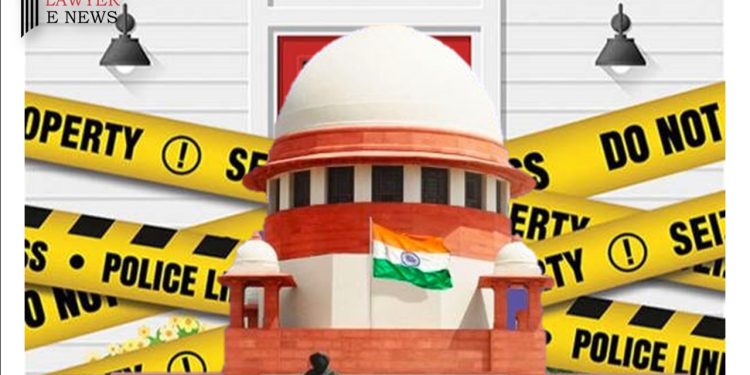Supreme Court Upholds Forfeiture of Illegally Acquired Properties

On 22 March 2023, Supreme Court, in a recent judgement (M/S. PLATINUM THEATRE AND OTHERS Vs. COMPETENT AUTHORITY SMUGGLERS &FOREIGN EXCHANGE MANIPULATORS (FORFEITURE OF PROPERTY) ACT, 1976 AND ANOTHER), considering the aim of Act, 1976, stated that forfeit illegally acquired properties of smugglers and foreign exchange manipulators, prevent smuggling activities and foreign exchange manipulations, and deprive such persons of their ill-gotten gains. The Act targets those who violate wealth-tax, income-tax, or other laws and hold properties in the name of relatives, associates, and confidants. Section 2(1) applies to persons specified in sub-section (2), which includes a list of categories, such as those detained under COFEPOSA and their associates, covering individuals who are members, partners, or directors of an association, body, partnership firm, or private company.
Facts
Appellant no.1 is a partnership firm with N.A. Yusuf, P.M. Saheeda, Mohd. Ali, Shaukat Ali, and Mumtaz as partners. N.A. Yusuf faced detention orders under COFEPOSA, which were later challenged and resulted in forfeiture orders being revoked. A show cause notice was issued to the firm (16th October 1994) regarding the forfeiture of M/s. Platinum Theatre. After several hearings and appeals, the competent authority passed the forfeiture order (31st December 1997). The Appellate Tribunal and the High Court dismissed subsequent appeals. The appeal challenged the judgment (19th April 2007) of the High Court of Karnataka, which upheld the forfeiture order (31st December 1997) under the Smugglers and Foreign Exchange Manipulators (Forfeiture of Property) Act, 1976.
Arguments
The appellants challenged the forfeiture order before Supreme Court based on three main arguments: (i) the land is owned by appellant no. 2, making the forfeiture legally unsustainable; (ii) the competent authority should have applied Section 9 of the Act, 1976, allowing appellants to pay a fine in lieu of forfeiture, as they disclosed the source of over 50% of the theatre’s construction cost; and (iii) the forfeiture proceedings were delayed, as the partnership firm dates back to 1974, and the forfeiture order was passed in 1997, causing prejudice to the appellants due to difficulty in tracing relevant documents.
The respondents opposed the appeal on the grounds that : (i) the appellants failed to discharge the burden of proof as per Section 8 of the Act, 1976, justifying the forfeiture order; (ii) both N.A. Yusuf and appellant no. 2 (P.M. Saheeda) failed to disclose sources of capital contribution, books of accounts, and bank accounts for the theatre’s construction, and Saheeda failed to prove her claim about the land purchase; (iii) since more than 50% of the value remained unexplained, the appellants are not entitled to an option to pay a fine in lieu of forfeiture under Section 9 of the Act; (iv) there was no delay attributable to the authority, as proceedings were initiated against the appellant firm in 1977, and the current proceedings began with a show cause notice on 16th October 1994, leading to the forfeiture order on 31st December 1997. Thus, no fatal delay occurred that warrants interference in the proceedings.
Observed and Held
The Supreme Court observed that the Act, 1976 aims to forfeit illegally acquired properties of smugglers and foreign exchange manipulators, prevent smuggling activities and foreign exchange manipulations, and deprive such persons of their ill-gotten gains. The Act targets those who violate wealth-tax, income-tax, or other laws and hold properties in the name of relatives, associates, and confidants. Section 2(1) applies to persons specified in sub-section (2), which includes a list of categories, such as those detained under COFEPOSA and their associates, covering individuals who are members, partners, or directors of an association, body, partnership firm, or private company.
The Supreme Court, considering the scope of the Act, 1976, stated that forfeiture proceedings could be initiated under Section 6 for illegally acquired properties by persons covered under Section 2. After complying with the principles of natural justice, the competent authority can pass a forfeiture order under Section 7. Section 8 states that the burden of proof lies on the affected person. If the source of less than one-half of the property’s acquisition is proven, the competent authority may offer the person an option to pay a fine in lieu of forfeiture under Section 9.
The Supreme Court observed that the respondents-initiated forfeiture proceedings against the appellants, and the competent authority found that the capital contributions made by the partners were not explained regarding their sources. The income-tax department assessed that the entire sum of Rs. 4.57 lakhs were the income of Appellant no. 2 (P.M. Saheeda). The Court noted that the appellants failed to justify the loan of Rs. 12 lakhs from Vijaya Bank and more than 50% of the theatre’s value remained unexplained, making it liable for forfeiture under Section 7 of the Act, 1976.
The Supreme Court further observed that the High Court, under Article 226, found that the appellants did not provide any documentary evidence as required under Section 8 of the Act 1976. The investments made by the partners remained unexplained, and Appellant no. 2 could not justify the land purchase from 1969. In these circumstances, the appellants were not entitled to the protection of Section 9 of the Act 1976.
The Supreme Court observed that the appellants argued for imposing a fine in lieu of forfeiture under Section 9 of the Act 1976. However, the High Court found that the appellants were not entitled to this protection, as they failed to provide a proper explanation for the acquisition of the land and the major part of the investment remained unexplained.
The Supreme Court found no error in the High Court’s findings and stated that no material had been placed before them to justify the sources of funds for the land acquisition. The majority of the investment still remained unexplained, and the accounts were not maintained for the cost of construction of the building. Thus, the authority did not commit any manifest error in forfeiting the property under Section 7 of the Act 1976.
The Court also noted that the plea of alleged gross delay in initiating the forfeiture proceedings was misconceived and deserved outright rejection, considering the sequence of events and the proceedings that had taken place in this case.
M/S. PLATINUM THEATRE AND OTHERS Vs. COMPETENT AUTHORITY SMUGGLERS &FOREIGN EXCHANGE MANIPULATORS (FORFEITURE OF PROPERTY)





